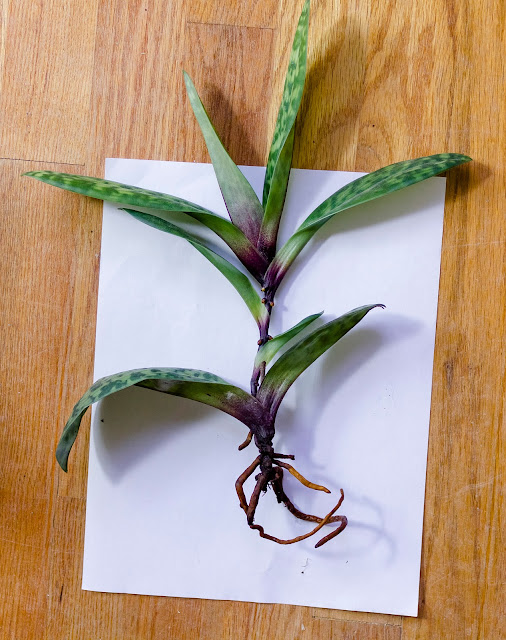Noid Paphiopedilum
I'm not sure what to do with my noid paph. Last year's new growth keeps growing ever taller, and ever farther out from the media. The stem on the growth keeps producing little root nubs which fail to grow. Meanwhile, it keeps producing more leaves, making the whole thing ever taller and more unstable.
My biggest worry is that if this year's newest growth appears high up on this stem, then there will be no way to bring its roots anywhere near the potting media.
Paphiopedilum roots
Although it hasn't been a year since the last repotting, I was a little concerned about the media taking a long time to dry between waterings. Fortunately, all the roots were healthy. They were also completely unchanged from last January. I don't know what it would take to get this orchid to grow new roots into the media.
I cleaned out the pot with a lysol wipe and a good wash, added fresh media, and put the paph back in, much as it was before. The orchid shed one of its bottom leaves during the process (it had been only losely attached), but there is yet another new leaf growing from the crown. To try and help promote at least a few more roots to grow from the stem, wrapped some sphagnum moss around the base, which I'll try to keep evenly moist.




I had a maudiae paph do this, too. I wrapped moss around the root points and laid it horizontally in a shallow plastic (disposable type) food storage container in which I'd put many large holes for drainage. It lived quite happily like this and seemed to stop elongating at least while I had it. I gave it away to a paph person which I decided I wasn't.
ReplyDeleteI might have to resort to something like what you describe if it keeps getting taller like this.
DeleteDid you ever figure out why it started elongating in the first place?
Check your extract you spray containing gibberlic acid
DeleteDon't keep it in super shaded area
I've had no luck with paphs. I've tried to grow them on two occasions and both times they died. Take a look at this Maria(in particular the bottom of page 17):
ReplyDeletewww.aosforum.org/pdf/Paph_beginner_1.pdf
Thank you for the link.
Delete"Under such unvaryingly warm conditions, paphiopedilums, both the modern hybrids and mottled-leaf species, may show symptoms of decline in the form of ...abnormal elongation of the rhizome between growths"
This is an interesting suggestion and potentially good news, as I've recently relocated my orchid shelves to be closer to an open window. They're certainly getting sufficient day/night temperature change now. Hopefully that helps.
My paph person attributes elongation and all such weird growth to "screwed-up" genetics. The result of intensive culture and breeding.
ReplyDeleteThat would be unfortunate if that's the case :-(
DeleteGreat Blog! I am very curious to know if new roots will grow. Thanks for your blog.
ReplyDeleteThanks! :-D
DeleteMaria, you have an interesting blog as it catalogs what you have learned from playing around with orchids. I'm no expert, but I do have some comments/suggestions. Elongation in some plants, like succulents, can be due to light fluctuations or lack of sufficient lighting. The plant stretches to reach for the light. Genetics aside, It is possible that during growth of the new section, the plant underwent some of this stretching. Of course, after reaching homeostasis, it continues to grow normally, but the elongated part will not get any thicker as it is no longer near the growth tip. I would experiment with vertical mounting, perhaps a pot with a stick supporting the new growth; or I would soak the plant for a good hour until all roots are malleable, lay the bottom half side ways with roots in media and the upper roots that haven't been growing resting directly on top of the media. The lower leaves may have to be removed.
ReplyDelete